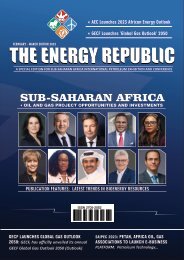The Energy Republic February Edition 2022
This magazine is a special edition focused on the challenges and growth opportunities in Sub- Saharan Africa oil and gas value chain, with a spotlight on stakeholders commentaries, while recommending some key strategies in unlocking the new opportunities in the African oil and gas industry....
This magazine is a special edition focused on the challenges and growth opportunities in Sub-
Saharan Africa oil and gas value chain, with a spotlight on stakeholders commentaries, while recommending some key strategies in unlocking the new opportunities in the African oil
and gas industry....
Create successful ePaper yourself
Turn your PDF publications into a flip-book with our unique Google optimized e-Paper software.
TOP STORY
“While we expect output to tick back up in
2022 and 2023 as jet fuel demand returns,
production is set to fall below 3 million b/d
already from 2025 unless heavyweights Nigeria
and Angola can stage a strong comeback and
shake off the dismal growth trends of the past
decade,”
The region’s production decline in 2021 is
driven by its two biggest oil producers, Nigeria
and Angola, which together are estimated to
have lost 440,000 b/d versus the pre-COVID-19
forecast. Crude oil production has dropped
significantly in Congo, Gabon, and Equatorial
Guinea, which together produced 250,000-
300,000 b/d in 2010, according to Rystad.
Equatorial Guinea has seen a 60% reduction in
oil production and Gabon nearly 35% in the
past 11 years.
Based on our findings, the production declines
vary from each African country due to several
issues and bottlenecks on operational
e x c e l l e n c e . L a c k o f i n v e s t m e n t &
postponement of final investment decisions
(FIDs) on projects, including a lack of
investment in critical infrastructures which
leads to frequent production shut-ins, a lack of
drilling at mature fields, and civil unrest caused
by militia groups has been identified by
stakeholders as the main causes of oil
production decline in Africa, while the COVID-
19 pandemic has also added to these issues
over the last couple of years - which has led to
significant production delays and production
shut-ins in some cases.
Financing: In an exclusive interview conducted
by African Energy Chamber (AEC), Kola Karim,
CEO and Managing Director of Shoreline
Energy International and AEC Advisory Board
Member, said that there is a financing gap for
both local producers and IOCs looking to invest
in new production.
In his words, "Banks are retreating from
lending to Oil and Gas projects, and this creates
an uphill task about the key cornerstone of any
turnaround which is financing.
"We need to create additional financing to fix
supply chains and allow manufacturing and
maintenance inputs to be located nearer to
production facilities on the continent and
“
We need more investment
in opening up additional
reserves to close the
production gap as
consumption returns".
.
Growth Opportunities (Frontier
Exploration)
Following the global energy transition agenda,
frontier exploration activity is reducing globally
Kola Karim, CEO and Managing Director of Shoreline Energy Interna onal
but, Sub-Saharan Africa seems to be different,
as several high-impact frontier wells are being
drilled today in frontier areas.
Africa leads on frontier drilling campaigns as
independents and international oil companies
(IOCs) are even planning to do more in frontier
basins across the region. Sub-Saharan Africa's
rig market which is an important indicator of
upstream activity is improving. According to
Statista analyses, more than 60 oil and gas rigs
are located in Africa. Of the total, 56 were land
rigs, while nine were offshore.
For TotalEnergies, Africa is one of the
company’s core areas of business activities,
with a consistent track record of more than 80
years operational excellence in Africa. The
company has been involved in exploration
activities in Nigeria for almost 60 years. Nigeria
is also crucial to the TotalEnergies Group,
accounting for 12% of its equity production.
TotalEnergies has invested approximately $10
billion US dollars in the country to date.
Through decades of executing development
projects, the company’s activities have
contributed to creating jobs and developing
human capacity in Nigeria.
Despite the challenging environment,
TotalEnergies remains committed to investing
in Africa. Lake Albert Development is among
the company's huge investment focus in Africa.
Having reached a deal with the governments of
Uganda and Tanzania, TotalEnergies and the
China National Offshore Oil Corporation
(CNOOC) have taken the Final Investment
Decision (FID) for the Lake Albert Development
in Uganda. The Lake Albert Development FID
marks a milestone in the development of a
viable East African energy market. With total
production estimated at 230,000 barrels per
day for the Tilenga and Kingfisher projects,
development is on track to start producing in
2025.
The TotalEnergies operated Tilenga project; the
CNOOC operated Kingfisher project; and the
construction of the East African Crude Oil
Pipeline – owned by TotalEnergies (62%), the
Uganda National Oil Company (15%), the
Tanzania Petroleum Development Corporation
(15%) and CNOOC (8%).
Deputy Managing Director, Deep Water District
of TotalEnergies E&P Nigeria, Mr. Victor Bandele
Speaking further on the growth opportunities
in Africa, the Deputy Managing Director, Deep
Water District of TotalEnergies E&P Nigeria, Mr.
Victor Bandele said that the time has come to
expand Nigerian Content to the rest of Africa
through Intra-African Trade.
Bandele pointed out that the African
Continental Free Trade Area is the largest free
trade area in the world – measured by the
number of participating countries.
The AfCFTA was intended to connect 1.3 billion
people across 55 countries with a combined
gross domestic product (GDP) valued at US$3.4
trillion. The agreement was also intended to
promote the movement of capital and people
from one place to another.
Bandele advocated for the oil and gas industry
to take advantage of AfCFTA in fostering intra-
African trade and expand the frontiers of
Nigerian content.
27
THE ENERGY REPUBLIC I SPECIAL EDITION















